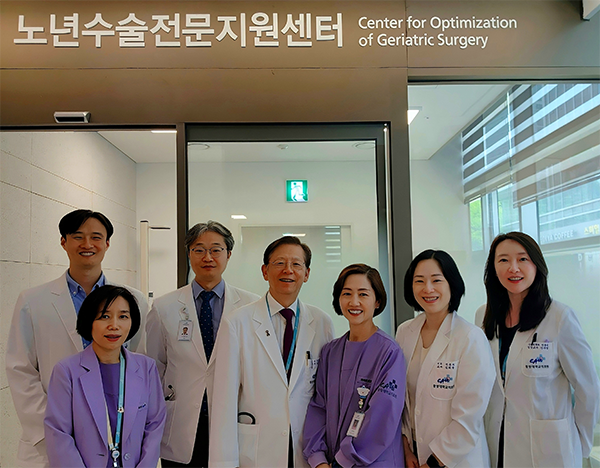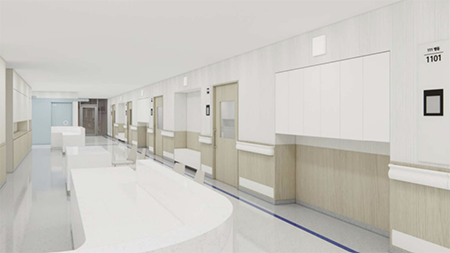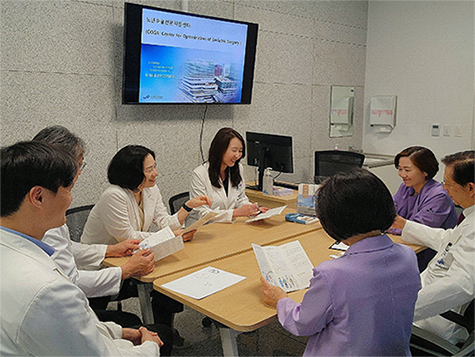
The Duke University Health System’s Perioperative Optimization of Senior Health (POSH) clinical model, an interdisciplinary team-based approach to safe surgical experience that smooths recovery for older patients, is being replicated across the country.
With the recent opening of South Korea’s first geriatric surgery optimization, the Center for Optimization of Geriatric Surgery (COGS) at Chung-Ang University Gwangmyeong Hospital, the innovative Duke clinical model is now being exported overseas.
“Like cogwheels working together in harmony, it emphasizes multidisciplinary collaboration (including patients and families) working in concert to provide optimal care,” said COGS Director Dr. Woo-Young Shin, MD, PhD, an assistant professor at Chung-Ang University College of Medicine who came to Duke in January 2023 as a visiting scholar to learn more about the POSH model.
Duke POSH is well known for the strong evidence it offers that integrated care coordination can lead to better postoperative outcomes. POSH outcomes have shown that patients have shorter lengths of hospital stays, lower readmission rates at one week and at 30 days, and are more likely to be discharged with self-care while experiencing fewer complications. (JAMA Surgery 2018)
Dr. Shin as a visiting scholar was inspired by all she saw — and learned.
Replicating POSH
In the Duke POSH clinic surgeons, geriatricians, advanced practice provider, anesthetists, and patients work together to identify and proactively address issues with older adults that may lead to surgical complications. Older adults are at risk for complications due to the likelihood that they have multiple prescriptions and medical conditions, and decreased strength, vision, and hearing.

POSH got its start in 2011 when Duke surgeon Sandhya Lagoo-Deenadayalan MD, PhD, approached the Geriatric Division for help determining what support older surgical patients might need. She collaborated with faculty members Mitch Heflin, MD, MHS, and Shelley R. McDonald, DO, PhD, who was a Geriatrics Fellow at the time. Dr. McDonald is now the POSH Director and an Associate Professor. The trio led the implementation of the POSH program at Duke Health and provided mentorship to help disseminate the POSH model.
POSH has since expanded to the Durham Veterans Administration Medical Center, and been replicated at the University of Texas Southwestern Medical Center, the University of Wisconsin Medical Center’s Geriatric Clinic, and Massachusetts General Hospital.
POSH is now a collaborative program between the Duke University Department of Medicine and the Department of Surgery, with its seeds of knowledge now taking root and flourishing in South Korea.
“I found the POSH team and Dr. McDonald’s passion, expertise, and the systematic operational model of the POSH program, truly inspiring,” Dr. Shin wrote in a recent note to the team. “Dr. Lagoo-Deenadayalan's practical advice regarding the barriers in the Korean healthcare environment, Dr. McDonald's sharing of clinical experiences and valuable reference materials, and Dr. Heflin's warm smile and thoughtful guidance during ward rounds have all been instrumental in establishing and operating COGS. I wanted you to know how your mentorship and support have contributed to providing better surgical experiences for older patients in Korea.”
The timing for COGS could not be better. South Korea is progressing at the fastest rate of aging in the world.
A Super-Aged Society
In December 2024, the country became what the United Nations classifies as a “super-aged society,” with more than 20% of the population aged 65 and older.

This milestone happened even sooner than initial projections for 2025, Dr. Shin said, giving the establishment of COGS even greater significance for Korean society.
The 2018 POSH JAMA paper — among the top 5% of all research outputs scored by Altmetric and cited in United Kingdom policy as evidence of delirium prevention and management — also addressed a critical need because, as the global population ages, the number of older adults undergoing surgery increases.
The effectiveness of the POSH model gives others like Dr. Shin who are interested in replicating such a program the supporting evidence to put it into practice. Though still in the early months, the team is already seeing positive outcomes.
“Surgeons are regularly referring older patients for preoperative evaluation, and patient and family satisfaction has been excellent,” Dr Shin said. “Most rewarding of all is seeing the beginning of a collaborative culture where not only the multidisciplinary team but also patients and families actively participate in discussions and care decisions – something that is still relatively uncommon in Korean healthcare settings."
Exporting Excellence
Like POSH, COGS includes dedicated space for comprehensive geriatric assessment, preoperative risk assessment and optimization protocols, patient education materials (adapted from Duke and culturally tailored to Korean patients), and a multidisciplinary team approach that includes surgery, anesthesiology, rehabilitation medicine, and psychiatry.
The clinic staff has also adopted a whole team approach. Interestingly, not all geriatrics perioperative programs include a geriatrician in the patient's care, but Dr. McDonald believes that having a geriatrician is a particularly important part of the perioperative team for vulnerable older adults and essential for perioperative planning throughout the entire surgical encounter.
"By incorporating a comprehensive geriatric assessment preoperatively, the team can ensure that the care provided is truly patient-centered,” Dr. McDonald said. “This approach not only optimizes the patient's overall health status prior to surgery but also aligns surgical care with the patient's personal values and priorities, thus ensuring that what matters most to them is always at the forefront of their treatment plan.”
POSH has hosted other clinical visitors as well from Canada, the Netherlands and Taiwan.
“For the past 14 years, we've been dedicated to shaping what should be the standard of care for older adults facing the challenges of surgery. It's truly humbling to realize that our efforts are now playing a role in establishing best practices for geriatric care on a global scale,” Dr. McDonald added.